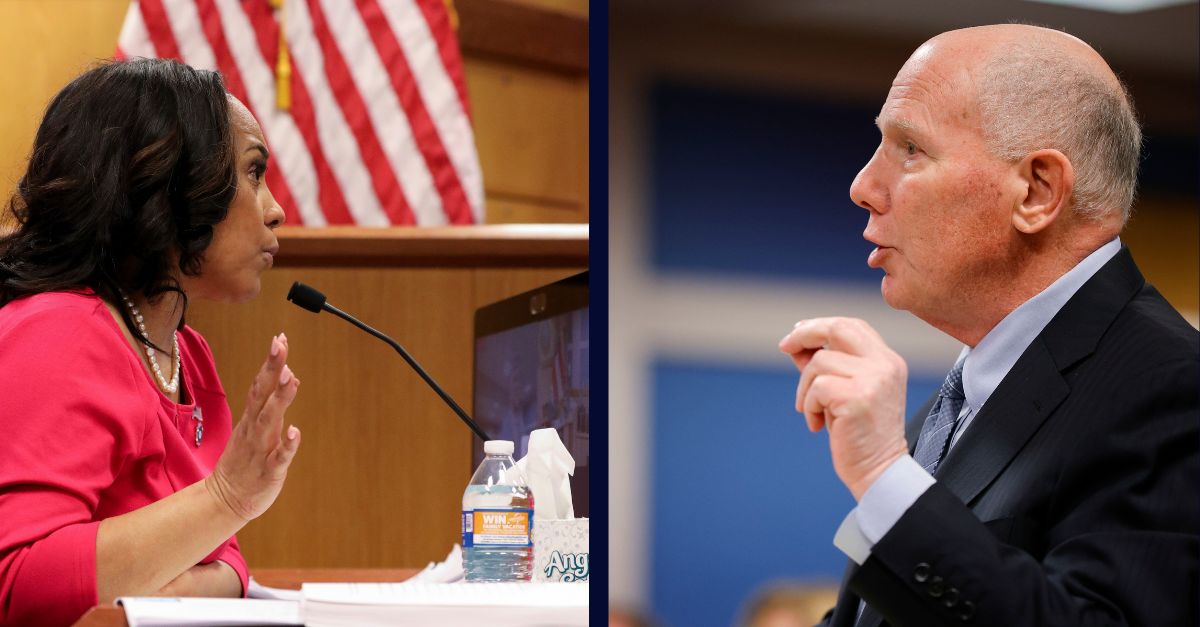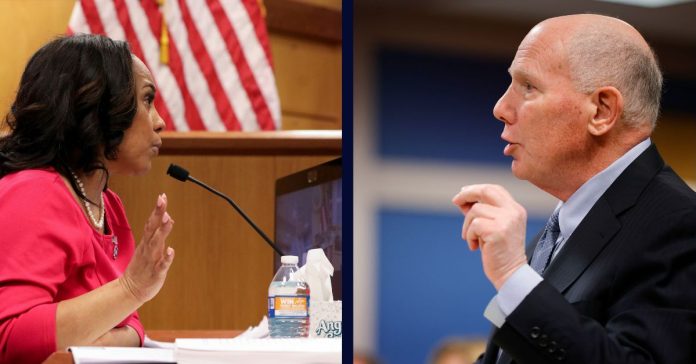
Left: Fulton County District Attorney Fani Willis testifies during a hearing on the Georgia election interference case, Feb. 15, 2024, in Atlanta (Alyssa Pointer/Pool Photo via AP). Right: Attorney Steve Sadow, former President Donald Trump’s lead attorney in the case speaks in court March, 1, 2024, in Atlanta. (AP Photo/Alex Slitz, Pool)
Fulton County District Attorney Fani Willis and Donald Trump’s lead Atlanta-based defense attorney sniped at one another in court filings amid the ongoing battle over whether the prosecutor should be removed from the marquee racketeering (RICO) and election subversion case she brought against the former president.
Late Tuesday, the district attorney’s office submitted a 17-page filing with the Fulton County Superior Court arguing the remaining co-defendants got the legal standard for disqualification dead wrong.
In a terse, 3-page reply, attorney Steve Sadow accused Willis and her team of misrepresenting one of the relevant legal standards.
After a hearing spanning a combined four days in mid to late February and early March, Fulton County Superior Court Judge Scott McAfee signaled that his decision over allegations of nepotism and self-dealing was likely to come down to what relevant legal standard applies.
Dueling standards
Defense attorneys have argued that even an appearance of a conflict of interest is sufficient for the disqualification of prosecutors in Georgia. Meanwhile, the state insists a defendant must show “an actual conflict” in order to toss a prosecutor from any given case.
Relevant case law in the Peach State is slim and could be read both ways. The cases on point often use the phrase “appearance of impropriety” but most of the cases using such language appear to have involved actual conflicts of interest involving prosecutors. This, and other tensions in Georgia law, suggest some latitude for McAfee when he rules on the conflict of interest issue.
Georgia criminal defense attorney and legal expert Andrew Fleischman mused about the issue on X (formerly Twitter):
There are cases that say we dq prosecutors for x and y. But there aren’t really any cases, for instance, that say only a stake in the outcome is sufficient to DQ.
And there’s only like ten cases total that really discuss the issue. So a lot of room for discretion.
— Andrew Fleischman (@ASFleischman) March 6, 2024
The state’s newest argument
While disinterested observers see muddy waters, the state, in its latest filing, insists the standard is quite clear — and quite high.
“The Defendants ask the Court to impose a novel, hair-trigger standard for the disqualification of an elected district attorney,” Willis’ supplemental brief reads. “But no such standard exists under our law. The true legal standard, set forth by our appellate courts and confirmed by statutory language, is much higher and requires proof of an actual, palpable conflict of interest with ‘a substantial basis in fact.’ That standard is high for a reason.”
Moreover, the district attorney’s office says, the actual conflict of interest proven must also apply to a very specific set of facts.
“[I]n every case the State has found involving disqualification of a prosecutor based on personal stake or interest, that personal interest has consisted of the prosecutor enjoying some direct pecuniary gain contingent upon the outcome of the criminal case,” the supplemental brief filed by the district attorney continues. “Without such a personal interest, sufficient to wholly displace the prosecutor’s role as an officer of the law, disqualification is not authorized.”
That would be a very tough standard to meet.
The sum and substance of the conflict of interest-based removal efforts amount to claims that Willis (1) began dating then-judge Nathan Wade sometime in late 2019; (2) eventually hired him to lead the high-profile RICO case in November 2021 despite his lack of experience; (3) reaped something not entirely unlike a financial windfall from Wade’s billable hours in terms of gifts and lavish vacations; (4) and then worked to cover up the scheme-like affair.
In other words, the defense has argued the mere fact of the lengthy investigation and ongoing criminal case itself — based on Willis hiring her alleged then-boyfriend and accepting gifts from him in the form of travel — are enough to, at the very least, show the appearance of a conflict of interest that is sufficient for disqualification.
Another defense argument
While most of the court’s time has focused on the nepotism and self-dealing allegations, Trump’s lead attorney has led a separate but related front in the effort to disqualify Willis and her office.
On Martin Luther King Jr. Day, Willis gave a lengthy speech at Big Bethel A.M.E. Church in Atlanta. In that speech, the district attorney pointedly referenced the furor over Wade and finances — casting opposition to his involvement in the case as racially motivated.
“I’m a little confused,” the DA told parishioners. “I appointed three special counsel, as is my right to do. Paid them all the same hourly rate. They only attack one. I hired one white woman, a good personal friend and great lawyer. A superstar, I tell you. I hired one white man, brilliant, my friend and a great lawyer. And I hired one Black man. Another superstar, a great friend and a great lawyer. Oh, Lord, they’re going to be mad when I call them out on this nonsense. First thing they say, ‘Oh, she going to play the race card now?’ But no. God, isn’t it them who’s playing the race card when they only question one?”
In two separate motions, Sadow criticized Willis for making “inflammatory extrajudicial racial comments” and accused her of improperly stoking “racial animus” to influence would-be jurors.
The defense’s less voluble references to the “church speech” were addressed at length during closing arguments by Sadow — and are sectioned off as “forensic misconduct” allegations against Willis.
The state also briefly addressed the forensic misconduct issue during closings when prosecutor Adam Abbate argued: “At no point did she mention the guilt or innocence of any of the defendants.”
Prosecutors largely waved away those concerns in their Tuesday filing — explaining that they were choosing to mostly ignore the issue while using a footnote to argue the defense did not “come close” to meeting the legal standard for proving forensic misconduct.
“No prosecutor in Georgia has ever been disqualified from prosecuting any case on grounds of forensic misconduct, and this case should not be the first,” the Willis supplemental brief reads.
Sadow, in Trump’s reply, first quickly accuses Willis and her office of overstating the standard for forensic misconduct.
The standard offered by the state quotes language from an opinion that listed “examples” of “forensic misconduct” but only cites of one those examples as “the standard,” the defense points out.
And, in any event, what Willis did was even worse, Sadow claims.
“Our case implicates far more appalling and unforgivable types of forensic misconduct — deliberately stoking racial and religious prejudice against defense counsel and the defendants, testifying under oath untruthfully, and committing fraud upon the tribunal — in the prosecution of the defendants,” the Trump reply reads. “While the State claims that no prosecutor has ever been disqualified in Georgia for forensic misconduct, no prosecutor in Georgia, elected or otherwise, has engaged in misconduct like Willis and Wade have here.”
Have a tip we should know? [email protected]

